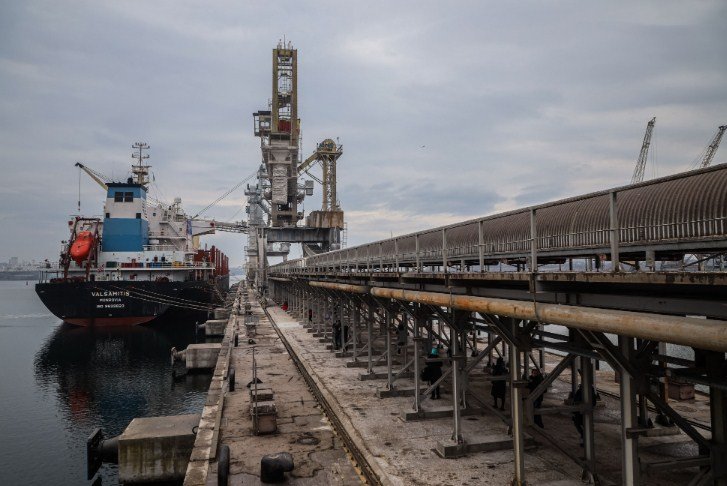Ukraine has shown resilience and determination in the face of Russian aggression, as it established its own trade route for food exports and received support from the EU to access frozen Russian assets.
Ukraine’s new trade route picks up steam
Ukraine has managed to export nearly 700,000 metric tons of grain through a temporary corridor that bypasses the Russian-controlled Black Sea, the Kyiv Independent reported. The new trade route was set up in August to move food exports out of its Black Sea ports near Odesa, defying Russian threats to target vessels coming and going from Ukraine’s ports.
A total of 62 vessels have already used the corridor and 37 vessels carrying over 1.3 million metric tons of goods, including agricultural and metal products, have already departed the ports of Odesa since its inception, Ukraine’s Infrastructure Minister Oleksandr Kubrakov announced on Oct. 27.
The new route has become a lifeline for Ukrainian farmers struggling to get their products out of the embattled country, as Russia exited the Black Sea Grain Initiative last year. The initiative, brokered by Turkey and the UN, allowed Ukraine to export more than 30 million metric tons of food commodities under a special regime that guaranteed safe passage for ships.
“It’s still early days for the temporary corridor, but it’s encouraging to see a fairly steady flow of inbound ships. More vessels clearing the ports without incident will also help reassure other interested shipowners who may be on the fence,” Bridget Diakun, data analyst for Lloyd’s List Intelligence, told the Kyiv Independent.
However, Ukraine has also imposed tight controls over grain traders to boost revenue during wartime, which may further complicate shipments from the country’s Danube and Black Sea ports, Bloomberg reported. The government has set quotas and minimum prices for exports of wheat, corn, barley, and sunflower oil, as well as requiring traders to register contracts with the state.
EU supports using frozen Russian assets to rebuild Ukraine
Ukraine may have gotten one step closer to gaining access to frozen Russian assets to put toward its massive reconstruction needs, the Kyiv Independent’s Alexander Query writes in his latest article on frozen Russian assets. European Union leaders on Oct. 27 expressed support for a proposal to use billions of euros in windfall taxes from Russian assets tied up in the West to rebuild Ukraine.
The proposal was put forward by Germany’s newly elected Chancellor Olaf Scholz, who said that Russia should pay for the damage it has caused in Ukraine and that the EU should use its leverage over the frozen assets to pressure Moscow to end the invasion. Scholz also said that the EU should increase its sanctions on Russia and provide more military and humanitarian aid to Ukraine.
The proposal was welcomed by Ukrainian President Volodymyr Zelensky, who said that it was a sign of solidarity and support from the EU. Zelensky also thanked Scholz for his initiative and said that he hoped that it would be implemented soon.
According to estimates by the International Monetary Fund (IMF), Russia has about €200 billion ($232 billion) worth of assets frozen in the EU and other Western countries, as part of sanctions imposed after Russia annexed Crimea in 2014 and invaded eastern Ukraine in 2015. The IMF also said that Ukraine needs about €50 billion ($58 billion) to rebuild its infrastructure and economy after seven years of war.
Most Russians oppose returning occupied territories to Ukraine
Meanwhile, most Russians would not support ending the invasion of Ukraine if it meant the withdrawal from Ukrainian territories currently occupied by Russia, a recent poll conducted by the Moscow-based Levada Center has shown. According to the survey, only 34% of Russians would support President Vladimir Putin if he decided to end the invasion and return occupied territories to Ukraine.
However, 70% of respondents said they would support Putin’s decision to end the invasion of Ukraine, without the caveat about returning territories. The questions were asked by dividing the respondents into two equal groups, with each group being asked the question in one of two formulations, the Levada Center said.
The Levada Center also found that “the level of support for the actions of the Russian Armed Forces in Ukraine remains high.” When asked if they personally support the actions of the Russian military in Ukraine, 76% of respondents replied “definitely” or “most likely” yes, a figure that has remained relatively stable over the past year of polling.
The poll also showed that Russians believe the invasion will last into the future, with 46% of respondents believing the war will last for more than another year. Another 23% said they believed it will last another six months to a year.
The Levada Center conducted the survey between Oct. 19 and Oct. 25, 2023, using a sample of 1,607 adults living across Russia.

